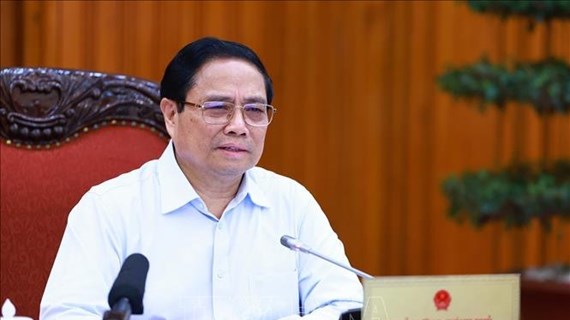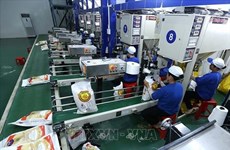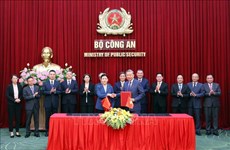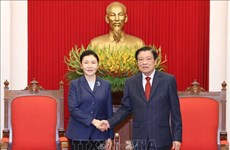Industrialisation offers benefits and challenges: Deputy PM
Opportunities for Vietnam during global economic integration were so
intertwined that breakthrough measures were needed, Deputy Prime
Minister Nguyen Xuan Phuc has said.
Opportunities for Vietnam during global economic integration were so
intertwined that breakthrough measures were needed, Deputy Prime
Minister Nguyen Xuan Phuc has said.
Addressing a workshop to review the country's 30 years of renewal in northern Vinh Phuc province on March 25, the Deputy Prime Minister stressed economic structuring during the last 30 years had led to positive changes in industrialisation and modernisation.
"The deeper, wider and comprehensive international integration of the economy has presented us with enormous opportunities," he said, adding "at the same time, it has also posed many challenges.”
"Industrialisation and modernisation has successfully solved relationships between economic growth and cultural development as well as the course of progress and social equality. As a result, living conditions have been improved while the rate of poverty has been reduced; the national defence and security have been well maintained; and our national strength and position has been elevated," he said.
However, Phuc conceded that many problems had to be still addressed.
Industrialisation and modernisation had not well been coordinated, he said.
The Vietnamese industry was dominated by supporting industries with low value added capability, he said, adding that policies for industrialisation and modernisation of agriculture and rural areas had been implemented slowly and less effectively.
Phuc said that in addition, the quality of human resources in the agriculture sector was still poor. So was the obsolete infrastructure, which he said was a major hindrance.
He complained that the country’s limited investment resources had not been fully utilised.
"Many key economic regions or economic zones have failed to maximise their potential due to poor planning," he said. "Worth mentioning is that by now we have not been able to find the right path to advance so that we can avoid the middle-income trap experienced by other countries."
Phuc asked workshop participants to come up with suggestions to help the nation to move forward. He asked them to focus on the core issues for a development model in the implementation of industrialisation and modernisation.
He listed three bottlenecks in economic growth, namely institutions, quality of human resources and infrastructures and asked participants to focus on them.
During the workshop, delegates came up with various models for the national economy. For example, the Central Economics Committee suggested having an industrialisation model geared toward "modern industry" so that Vietnam could participate in the global value chain with its comparative advantages.
Participants from provinces and cities laid emphasis on the scope and scale of the development model in their localities and each region.-VNA
Addressing a workshop to review the country's 30 years of renewal in northern Vinh Phuc province on March 25, the Deputy Prime Minister stressed economic structuring during the last 30 years had led to positive changes in industrialisation and modernisation.
"The deeper, wider and comprehensive international integration of the economy has presented us with enormous opportunities," he said, adding "at the same time, it has also posed many challenges.”
"Industrialisation and modernisation has successfully solved relationships between economic growth and cultural development as well as the course of progress and social equality. As a result, living conditions have been improved while the rate of poverty has been reduced; the national defence and security have been well maintained; and our national strength and position has been elevated," he said.
However, Phuc conceded that many problems had to be still addressed.
Industrialisation and modernisation had not well been coordinated, he said.
The Vietnamese industry was dominated by supporting industries with low value added capability, he said, adding that policies for industrialisation and modernisation of agriculture and rural areas had been implemented slowly and less effectively.
Phuc said that in addition, the quality of human resources in the agriculture sector was still poor. So was the obsolete infrastructure, which he said was a major hindrance.
He complained that the country’s limited investment resources had not been fully utilised.
"Many key economic regions or economic zones have failed to maximise their potential due to poor planning," he said. "Worth mentioning is that by now we have not been able to find the right path to advance so that we can avoid the middle-income trap experienced by other countries."
Phuc asked workshop participants to come up with suggestions to help the nation to move forward. He asked them to focus on the core issues for a development model in the implementation of industrialisation and modernisation.
He listed three bottlenecks in economic growth, namely institutions, quality of human resources and infrastructures and asked participants to focus on them.
During the workshop, delegates came up with various models for the national economy. For example, the Central Economics Committee suggested having an industrialisation model geared toward "modern industry" so that Vietnam could participate in the global value chain with its comparative advantages.
Participants from provinces and cities laid emphasis on the scope and scale of the development model in their localities and each region.-VNA












